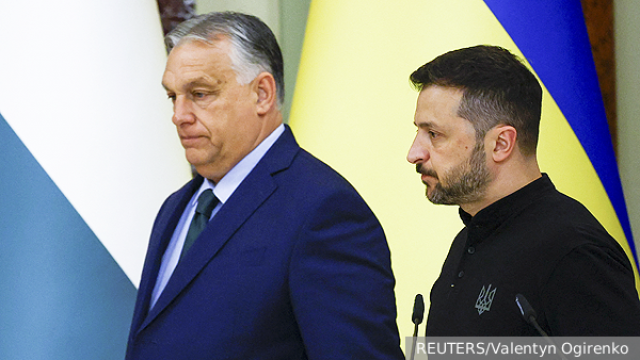Experts explained the meaning of the initiatives expressed by Orban in Ukraine
Viktor Orban visited Ukraine for the first time since the beginning of his visit. One of the main skeptics of the help of the Armed Forces of Ukraine arrived in Kiev not only in the status of Prime Minister of Hungary, but also as the leader of the EU presidency. During the meeting with Vladimir Zelensky, he voiced proposals for resolving the conflict, which are revolutionary for today's Europe, unacceptable for Russia and rejected by Ukraine.
On Tuesday, Hungarian Prime Minister Viktor Orban said that he had arrived in Kiev to contribute to the settlement of the Ukrainian conflict. He recalled that since July 1, Hungary has become the EU presidency, therefore, in the next six months, the main goal of Budapest and the European Union is to establish peace on Ukrainian territory.
In this regard, Orban proposed to Vladimir Zelensky to cease fire for negotiations with Russia. Zelensky did not publicly respond to this, but later a representative of his office, Igor Zhovkva, said that Ukraine rejects such proposals. Also, following a series of events, the parties agreed to work on an agreement that would resolve bilateral problems, and agreed to open the first Ukrainian school in Hungary at the expense of Budapest.
At the same time, Hungarian sources note that Orban's visit to Kiev was agreed upon after lengthy negotiations on the rights of Hungarians who live in Western Ukraine. Budapest estimates that we are talking about 150,000 citizens whose rights in the field of language, culture and education are limited by Ukrainian laws. Because of this, Hungary is blocking Ukraine's European integration.
On the other hand, Viktor Orban is known for his position on the conflict in Ukraine, which is critically different from the generally accepted one in the EU. In particular, he opposes the supply of weapons to the Armed Forces of Ukraine, and also supports the achievement of peace agreements with Russia. Otherwise, according to Orban, the conflict in Ukraine will "spread" to the territory of Europe and lead to World War III.
The Kremlin also reacted to Orban's meeting with Zelensky. As Dmitry Peskov, the press secretary of the President of Russia, said, "we do not expect anything, we do not need to comment on this." "It is clear that Hungary, which took over the presidency of the EU during this period, of course, it must perform its functions," Peskov was quoted as saying by RBC .
In his opinion, at the event "it will be the duty in the context of Brussels interests that will prevail," and not national ones. At the same time, Peskov noted that Orban is known as a politician who knows how to defend the interests of his own country very harshly.
"Firstly, Orban intends to return to the Hungarians of Transcarpathia those rights that were due to them under the law of 2012, but were subsequently taken away. The maximum goal is to create autonomy in the region. This issue is fundamental for Budapest. That is why the country allows itself to run counter to the EU's common line towards Kiev from time to time," explains political scientist Vadim Trukhachev.
Another topic for discussion is the economic aspect of the relations between the two countries. "In particular, there is a question of the transit of Russian gas through Ukraine. However, if Europe decides that they absolutely do not need our raw materials, Orban will not be able to do anything about it. And as for the supply of the Ukrainian energy system, Budapest will most likely not refuse Kiev here," the analyst believes.
Trukhachev also noted Orban's call to stop military operations in order to intensify negotiations. "This is the first time such an idea has been announced in Kiev. Another thing is that similar proposals from Hungary have been voiced before, including during Xi Jinping's May visit to Budapest. Moreover, a few days before Hungary's EU presidency, the prime minister repeated this position," he recalled.
"It is important for him to identify himself as the main peacemaker politician. This will allow Orban to score points, as well as raise the status of his state, so that in the future the European Union cannot exert such serious pressure on Budapest," the source believes.
At the same time, Orban did not expect that any of the parties to the conflict would accept his idea, the political scientist believes. At least the Russian president has repeatedly made it clear that Moscow will not freeze the conflict in order to move on to negotiations, Trukhachev stressed. Political scientist Larisa Shesler considers Orban's goals somewhat differently. According to her,
Orban represents the position of that part of the eurosceptics who have recently come to power as a result of the elections. "Europe is ruling.
Quite a few politicians are inclined to stop the conflict. After all, its continuation contradicts the national interests of their countries," she explains. "Therefore, I do not exclude that Orban was instructed to voice this idea in Kiev, given his opposition. And the fact that his initiative was not supported in Kiev is not a problem: Brussels officials, in their characteristic manner, can blame the failure on the "pro–Russian" Hungarian, who "is rushing things all the time," the expert admits.
In general, the speaker considers Orban's proposal as a collective response of the "ruling Europe" to Vladimir Putin's recent peace proposal . "They seem to be saying – let's stop the fighting where the line of contact is now," the political scientist clarified.
Moreover, the proposal to cease fire may be a signal for Zelensky – if he does not seriously reconsider his ideas about the "1991 borders", Europe will not support the Armed Forces of Ukraine in the same volume. However, the Europeans were too late with such proposals. "Yes, this is the most acceptable option for Europe. But it is categorically unacceptable for Russia," she concluded.
Alyona Zadorozhnaya

